10 Unexpected Side Effects Of Kiwi Fruit
While the fruit is nutritious, you may want to limit its intake for your overall health.

Image: Midjourney/ StyleCraze Design Team
Fruits are mostly known for their health benefits! Especially when it comes to vitamin C-rich fruits like kiwi. However, are you aware that there could be a few possible side effects of kiwi fruit as well? Well, yes, there are a few things you need to keep in mind before you reach for kiwis (1). To help you know better, we have done all the required research and summed it up for you in this article. Read on to know more about the side effects of kiwi, how much kiwi fruit you should consume, and when it is best to avoid it.

 Know The Flip Side: Kiwi
Know The Flip Side: KiwiShort-Term Effects
Mouth irritation, rashes, vomiting, nausea, diarrhea, dizziness, and difficulty swallowing.
Long-Term Effects
May lead to acute pancreatitis, skin disorders like dermatitis and anaphylaxis, and oral allergy syndrome.
Drug Interactions
Excessive kiwi intake may cause interactions with antifungal, anti-inflammatory, heparin, and antiplatelet medications.
When To See A Doctor
If you feel extreme mouth irritation (especially if you have latex allergies), stomach discomfort, vomiting, and diarrhea (especially if you have pancreatic disorders).
In This Article
Kiwi Fruit Side Effects – Top 10
Yes, it is known for its unique sweet flavor and the number of benefits (2). People across the world love this fruit. But there are kiwi fruit side effects that may pop up if eaten in large quantities.
Some of the major side effects of kiwi fruit are
1. Allergic Reactions

One might develop allergic reactions due to the consumption of kiwi fruit (3). It is important to be cautious while eating it. Many individuals, who consumed kiwi fruit in large quantities have reported cross-sensitization and different types of allergies. Some of the symptoms associated with allergic reaction to kiwi are mouth tingling, throat swelling, headache, breathing difficulties, abdominal pain, dizziness, fatigue, and heart palpitations (4).
 Trivia
Trivia2. Rashes And Swelling

According to studies, it has been found that overeating of kiwi can lead to swelling. Anaphylaxis can also occur in people eating too much of kiwi (5). Rash, asthma and hives are also common. It can also lead to local mouth irritation.
3. Oral Allergy Syndrome (OAS)

Many people have reported OAS due to the overeating of kiwi. The OAS includes swelling of mouth, lips and tongue (6). It also leads to tingling and itching sensations in the mouth.
4. Dermatitis

Individuals consuming high quantities of kiwi on a daily basis may develop skin irritation and skin disorder, such as dermatitis (7).
5. Pancreatitis Problem
Overeating of kiwi can lead to acute pancreatitis (8). This tasty fruit comes enriched with potassium, serotonin and Vitamin C and E. High doses of these components can alter the triglyceridei A type of fat produced in the body that gives you energy and is stored in the blood. It is also available in the foods you eat. level in the blood, which may harm the pancreas in the long run.
6. Diarrhea And Collapsing

One of the kiwi fruit side effects is digestive problems, including vomiting, nausea, and diarrhea. It may also lead to fainting, bloating, fever, chills, sweating, muscle weakness, and difficulty in swallowing.
7. Latex Allergy
As per studies, it has been found that most people with latex allergy are also prone to developing kiwi allergy (9). If you have allergic reactions to latex, then you should avoid consumption of kiwi and products with kiwi.
8. Breast Feeding And Pregnancy
If you are a nursing mother or pregnant, then consult your doctor regarding the dosage of kiwi. Over eating this fruit during pregnancy can affect your health negatively.
9. Interaction With Some Specific Types Of Drugs
According to many researches, it has been found that this fruit has anti-fungal activities and can lead to addictive effects when eaten with other anti-fungal medicines. It increases the chances of bleeding, if taken with specific types of drugs. Some of the drugs are anticoagulantsi They are blood thinners or chemical substances that help prevent blood clots and prolong the time it takes to form a blood clot. , aspirin, heparin, anti-platelet drugsi They are medications that help prevent blood clots by making platelets less sticky and stopping them from sticking together. , and non-steroidal anti-inflammatory drugs. Kiwi may lower your blood pressure further if you are on high blood pressure medications.
10. Interactions With Dietary Supplements And Herbs
As mentioned before, Kiwi has antifungal properties. Hence, it leads to an addictive effect when eaten with other antifungals. Kiwi has a high concentration of serotonin. Selective serotonin reuptake inhibitors (SSRIs) can alter the serotonin levels in the human body. Generally, it increases the serotonin level. Thus, SSRIs and kiwi can lead to synergistic effects on the levels of serotonin.
 Fun Fact
Fun FactIf you are taking any high doses of medicine or suffering from critical health disorders, then it is suggested to consult with a doctor and know completely about kiwi fruit benefits and side effects. Moreover, it is also advised to take kiwi in limited quantities. In case you are suffering from any of the kiwi side effects mentioned above, it is better to visit your doctor now. Better safe than sorry!
You need to understand the potential side effects of kiwi fruit to take the necessary precautions for safe consumption. Scroll down to know more.
Practical Tips For Safely Consuming Kiwi
- Pick kiwis that are slightly firm to the touch but give slightly when pressed. Fruits that are too soft or wrinkled may be overripe.
- Wash the kiwis under running water to get rid of any dirt or other pollutants, even if you intend to peel them.
- Although the skin is edible, it may be difficult for some people to digest. Instead, cut the fruit in half and scoop out the flesh or remove the peel with a knife or spoon.
- If you have never eaten kiwi before, start with tiny servings because some people may have sensitivities or allergies. The taste may be too tart for some as well.
- Combine kiwi with other foods, such as salads, cereals, or yogurt, to lessen stomach pain and acidity.
- Although the seeds are edible, those who have sensitive stomachs may choose to stay away from them. Just remove the flesh surrounding the seeds with a spoon.
- After eating kiwis, keep an eye out for any signs such as swelling, itching, or pain, particularly if you have a history of fruit allergies.
- Unripe kiwis should be left at room temperature to soften. To preserve freshness, keep them refrigerated once mature.
Do you like kiwi? Have you ever faced any of these kiwi fruit side effects? Share with us in the comments section below.
Key Takeaways
- Overeating kiwis may lead to dermatitis and diarrhea.
- High doses of vitamins E and C in kiwis may harm the pancreas in the long run.
- Individuals with latex allergy must avoid kiwis and products made with kiwi.
- Kiwis may interact with certain dietary supplements, anticoagulants, and antiplatelet drugs.
Infographic: Side Effects Of Kiwi Fruit To Look Out For
The kiwifruit is a Chinese delight that you may find difficult to resist, but if you look closely at its side effects, you may put an end to eating too much of it. Your body, especially your skin, may end up taking the brunt of your indulgence.
Check out the infographic below to learn more about the adverse effects kiwifruit has on your body.
Some thing wrong with infographic shortcode. please verify shortcode syntax
Kiwis are also known as Chinese gooseberries, which have a rich nutritional profile. The plant compounds, antioxidant, and anti-inflammatory properties in kiwi fruit help treat many ailments. Thus, there are various kiwi fruit benefits. However, one must also be aware of the fruit’s unexpected side effects. Overconsumption of kiwis may cause allergic reactions, rashes, swelling, oral allergy syndrome (OAS), dermatitis, pancreatitisi An inflammation of the pancreas mainly caused when the digestive enzymes or juices attack the pancreas due to alcoholism or gallstones. , diarrhea, and latex allergies. In addition, it may interact with some types of drugs, dietary supplements, and herbs. It also may negatively affect the health of lactating and pregnant women. Hence, eat them in moderation to avoid their adverse reactions.
Frequently Asked Questions
What happens if you eat kiwi every day?
Kiwi is loaded with many beneficial nutrients that can promote overall health, reducing the risk of stroke and heart disease. However, eating it in moderation is advised.
How many kiwi fruits can I eat a day?
One can eat one whole kiwi fruit a day.
Is it okay to eat kiwi at night?
Yes, it is okay to eat kiwi at night. Kiwis can improve sleep quality if taken in moderation.
Can we eat kiwi on an empty stomach?
Yes, kiwis can be eaten on an empty stomach. They help in boosting energy and promoting detoxification.
Do kiwis give you gas?
No, kiwis do not give you gas.
Is kiwi full of sugar?
No, kiwis are not loaded with sugar. They are rich in vitamin C and have low sugar content.
Is kiwi fruit high in histamine?
No, kiwis have low levels of histaminei A biologically active substance produced as part of the immune system that causes symptoms of allergies. .
Does kiwi cause joint pain?
No, kiwis do not cause pain in the joints.
Does kiwi pose a threat of kidney stones?
Kiwis are high in oxalate, but their moderate consumption is not dangerous. However, excess consumption might cause stones in the kidney.
How to eat kiwi?
One can eat kiwi by cutting it into half using a knife and scooping out the flesh with a spoon. Alternatively, you can peel the kiwi first and slice it or eat it without peeling. You can also add kiwi to your salad, smoothies, or ice cream.
Illustration: Unexpected Kiwi Fruit Side Effects
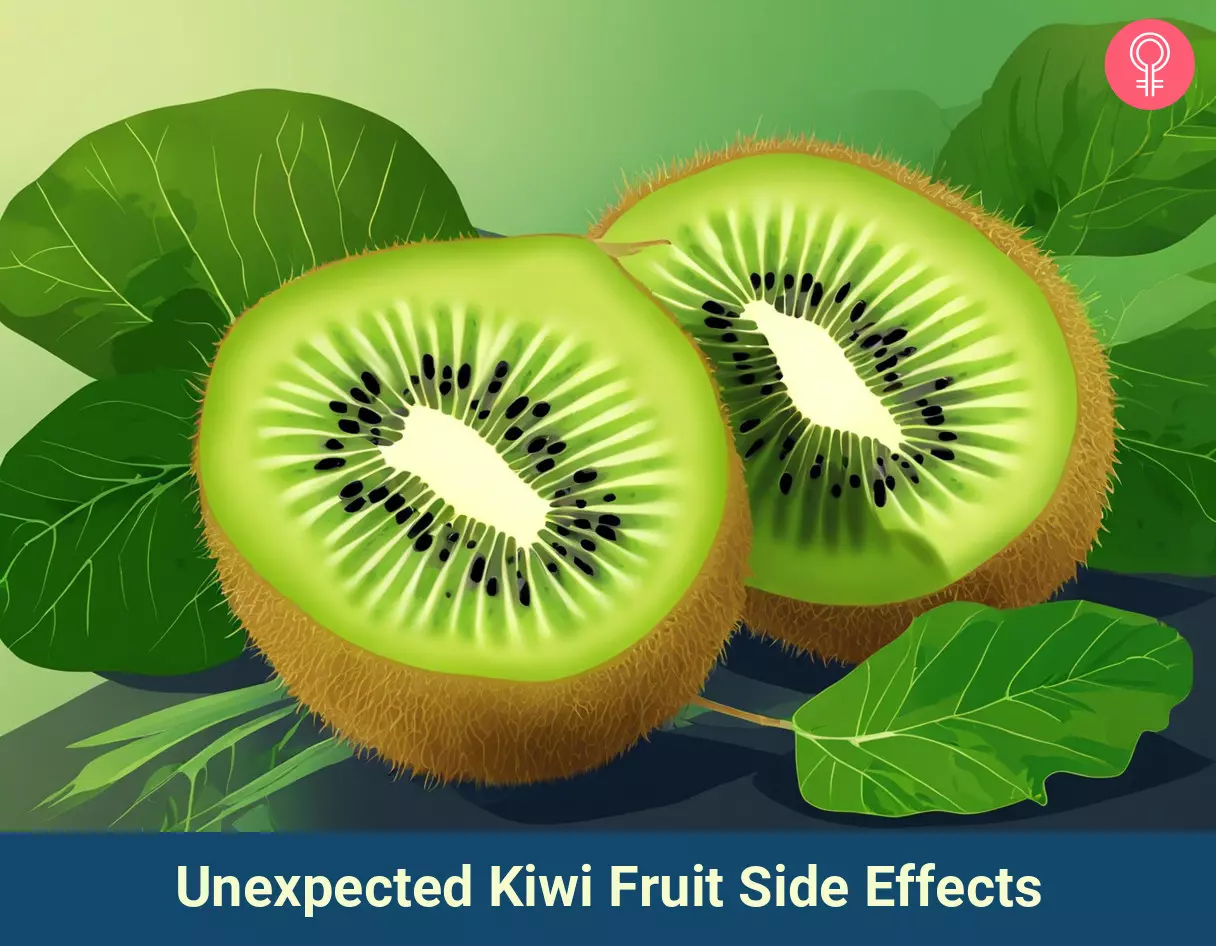
Image: Stable Diffusion/StyleCraze Design Team
Kiwi may be beneficial for those who are pregnant due to its rich vitamin and mineral content. Watch the video below to learn about the health benefits and potential side effects of consuming kiwi during pregnancy.
References
Articles on StyleCraze are backed by verified information from peer-reviewed and academic research papers, reputed organizations, research institutions, and medical associations to ensure accuracy and relevance. Read our editorial policy to learn more.
- Kiwifruit green raw
https://fdc.nal.usda.gov/fdc-app.html#/food-details/168153/nutrients - Kiwifruit our daily prescription for health
https://pubmed.ncbi.nlm.nih.gov/23746068/ - Kiwi fruit allergy: a review
https://pubmed.ncbi.nlm.nih.gov/14675467/ - Kiwifruit’s Allergy in Children: What Do We Know?
https://www.researchgate.net/publication/372370184_Kiwifruit’s_Allergy_in_Children_What_Do_We_Know - Anaphylaxis after accidental ingestion of kiwi fruit
https://www.ncbi.nlm.nih.gov/pmc/articles/PMC3834723/ - Allergy to kiwi
https://www.jacionline.org/article/S0091-6749(03)02851-3/fulltext - Contact urticaria on eczematous skin by kiwifruit allergy. In vivo component-resolved diagnosis
https://pubmed.ncbi.nlm.nih.gov/25456531/ - Food-induced acute pancreatitis
https://www.ncbi.nlm.nih.gov/pmc/articles/PMC5718054/ - The latex-fruit syndrome
https://pubmed.ncbi.nlm.nih.gov/12440950/
Read full bio of Tanya Choudhary
Read full bio of Ravi Teja Tadimalla
Read full bio of Moksha Gandhi



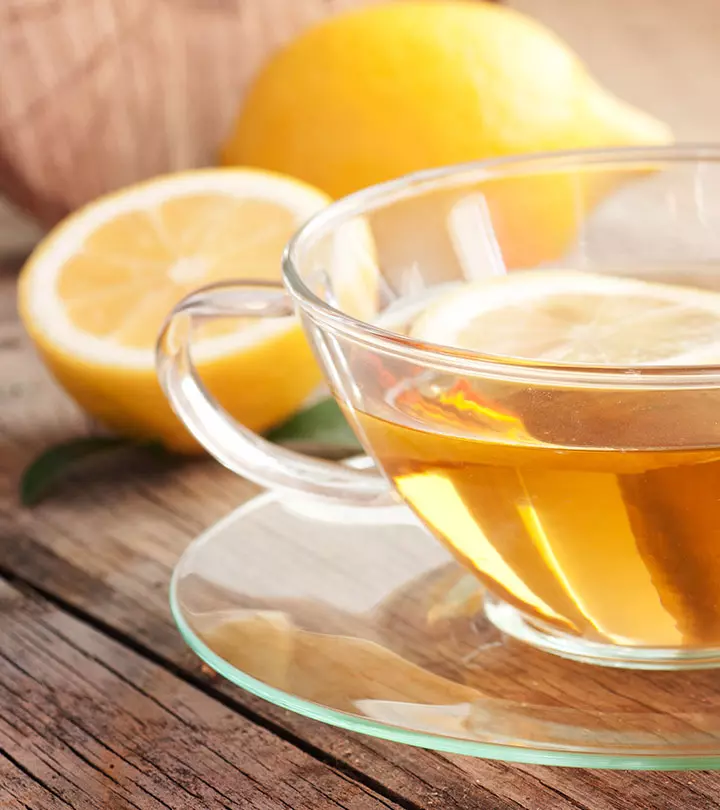
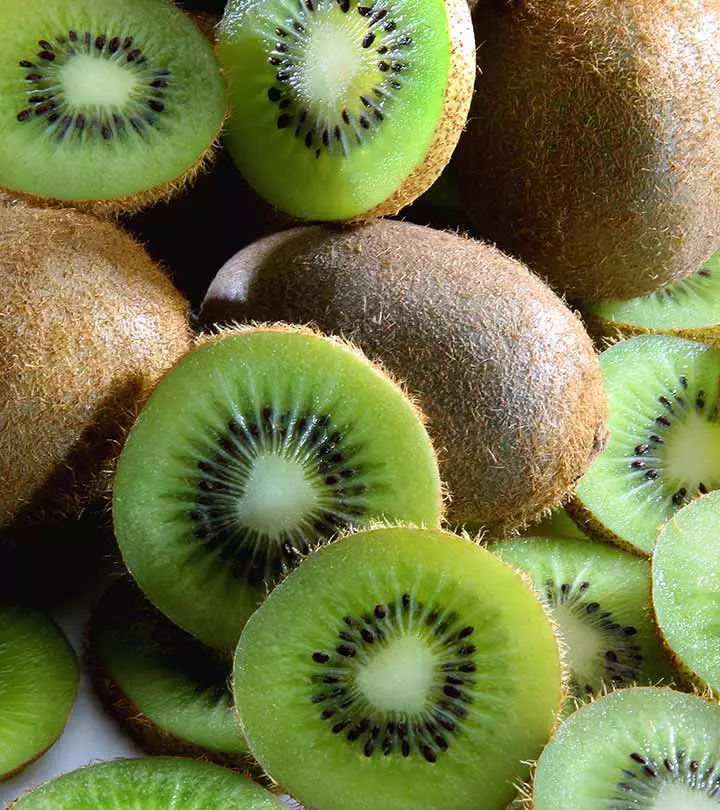

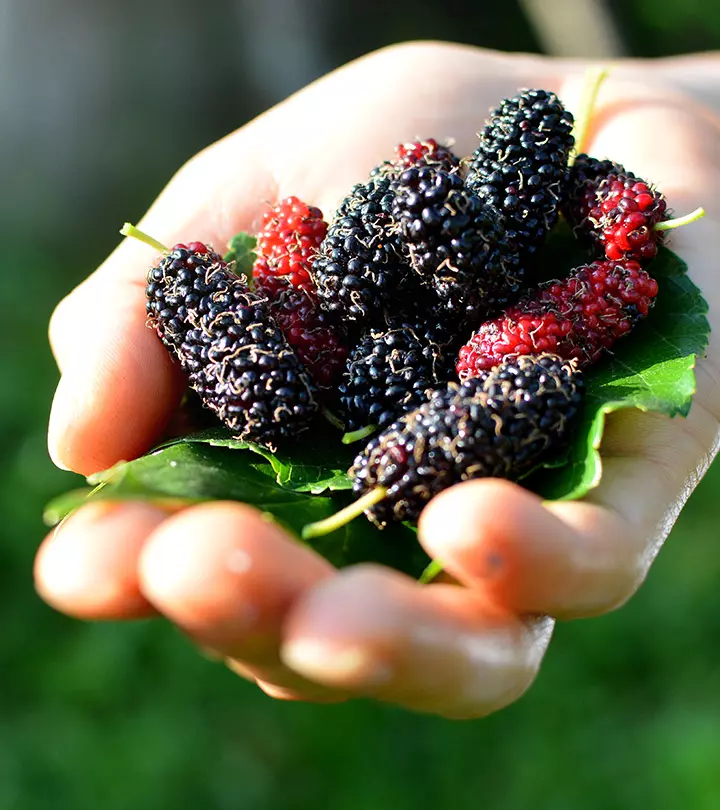




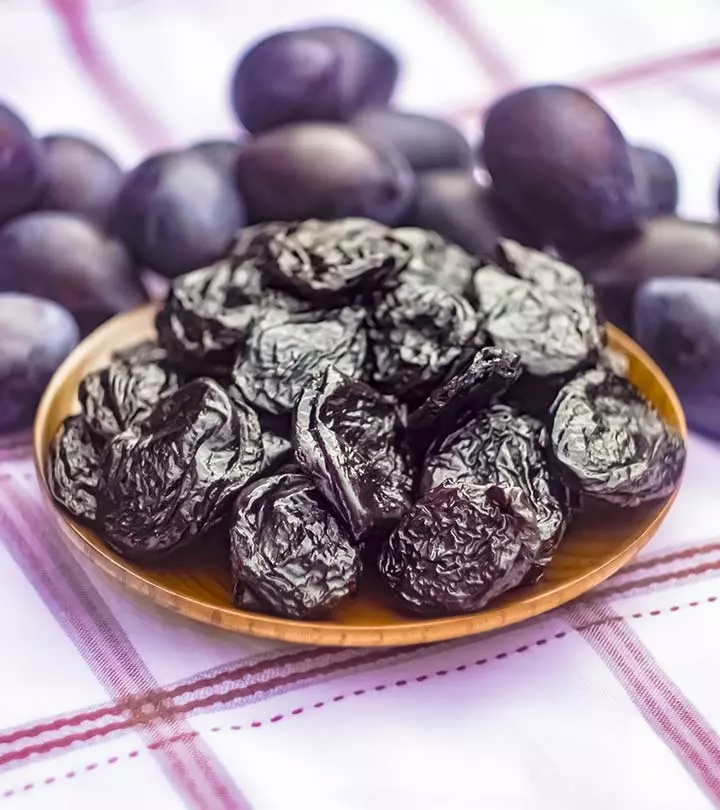
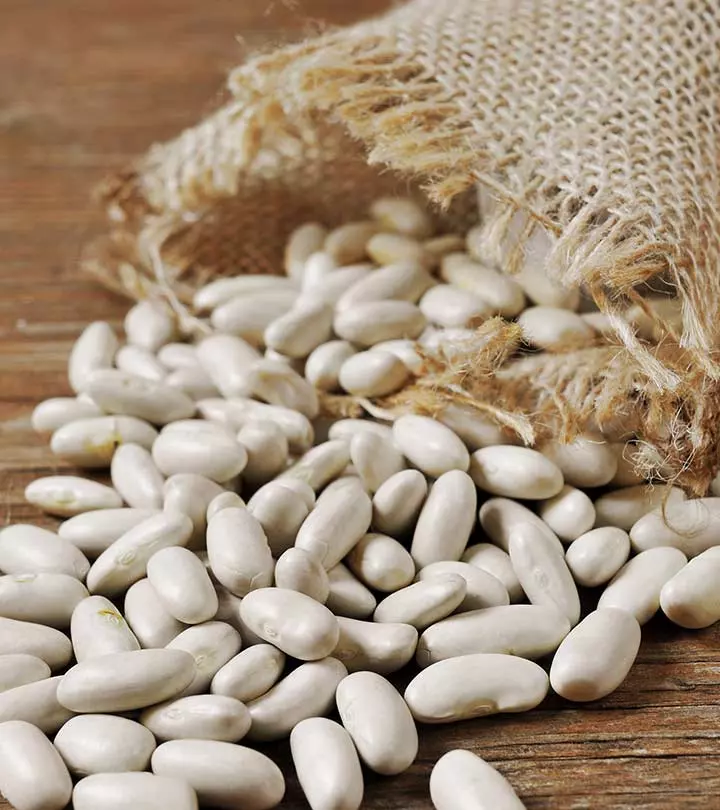



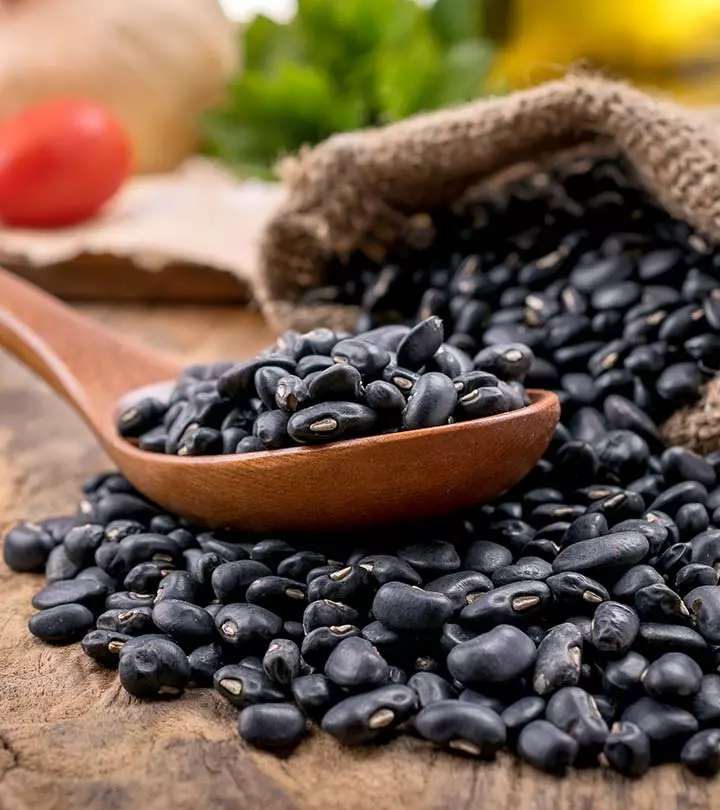



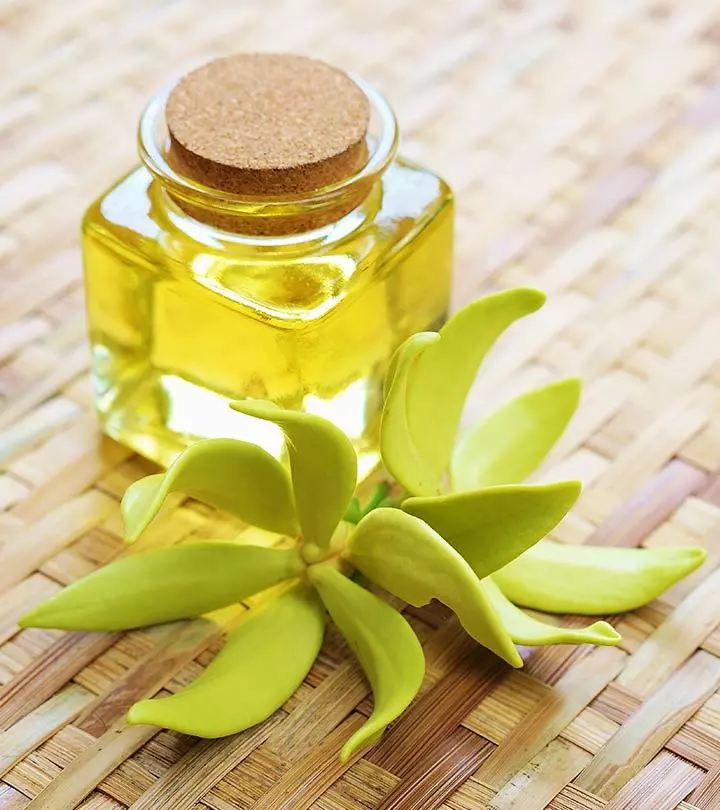



Community Experiences
Join the conversation and become a part of our empowering community! Share your stories, experiences, and insights to connect with other beauty, lifestyle, and health enthusiasts.